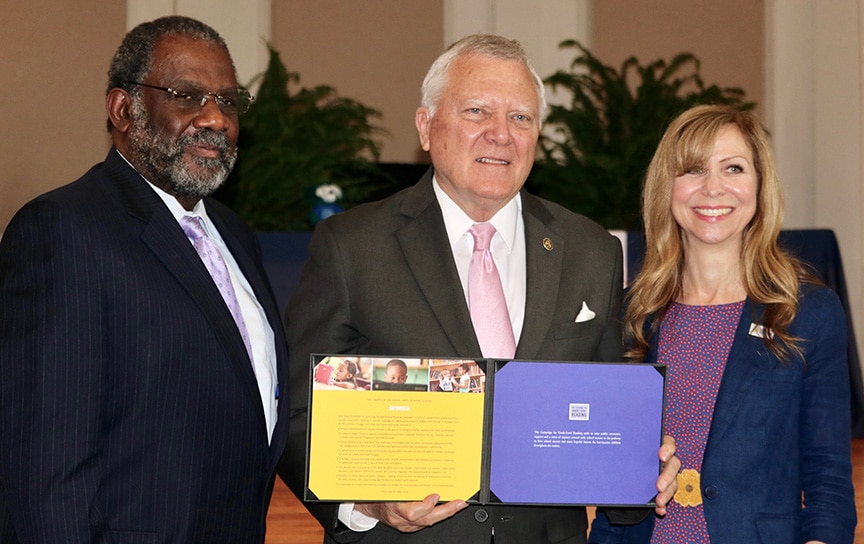Georgia Honored as Pacesetter for Commitment to Early Literacy and Student Success

Campaign for Grade-Level Reading (CGLR) Managing Director Ralph Smith presented a “State Pacesetter” honor to Georgia on June 21 in recognition the Get Georgia Reading Campaign’s exemplary work to increase the number of low-income children reading at grade-level by the end of third grade.
Smith presented the award to Get Georgia Reading Campaign Director Arianne Weldon, Governor Nathan Deal, and First Lady Sandra Deal during the second annual Governor’s Summit on Early Language and Literacy held at Georgia College in Milledgeville.
Georgia is being recognized as a Pacesetter due to its focus on both the state policies and systems change needed to move the needle on grade-level reading and its focus on building local capacity, with 74 Grade-Level Reading communities in 68 counties.
According to Smith, recognizing the Pacesetters is CGLR’s way of applauding the civic leaders, organizations, and agencies that have joined forces to build brighter futures for the children in their states and communities. He noted that success factors the CGLR identified are variously distributed across many states and jurisdictions—but that Georgia has them all.
“There’s a set of goals in Georgia that is ambitious, achievable, and actionable,” said Smith. “There’s shared ownership and joint accountability, plans and efforts are research-based and data-driven, and attention is given to those who would normally fall off the edge—and who would be considered the acceptable casualties or the appropriate statistic. There’s leadership in the private sector, in the philanthropic sector, and especially in the public sector. In no other state have we found the depth and breadth of agency involvement and commitment to literacy.”
Reading proficiency by the end of third grade is a critical milestone toward high-school graduation and career success because it marks the transition from learning to read to reading to learn. National tests show that two-thirds of fourth-graders in the U.S.—four-fifths of whom are from low-income families—aren’t reading proficiently.
“We spend a lot of time, effort, and money to find a way to bring chronically failing schools up to par,” said Gov. Deal. “It’s a tough undertaking, but I feel certain if you analyze statistics and talk to the people involved—if you really bore down deep—it’s the fact that children did not learn to read proficiently at an age in their life when they should have learned that skill. They may have been able to bluff their way for a few grades and it never caught up with them sufficiently, but when it does catch up with them, they become desperate. And what happens is they drop out of school. Many people just overlook the simple fact that if you cannot read, you are a prisoner in our world.”
The Get Georgia Reading Campaign is a coalition of nearly 100 public, nonprofit and philanthropic partners addressing four pillars that create the conditions necessary for children to achieve reading success: Language Nutrition, Access, Positive Learning Climate, and Teacher Preparation and Effectiveness.
These pillars provide a new way of looking at early literacy and learning during the first eight years of life. Partners use the pillars to challenge conventional approaches, sustain cross-sector collaboration, and support collective action in communities throughout the state.
“This honor speaks to the commitment of the many organizations, individuals, and policymakers who share a vision that all children in Georgia need to read proficiently by third grade,” said Weldon. “We haven’t reached the finish line, yet—but we are so thrilled to celebrate our progress and keep working toward the shared expectation that we create the conditions essential for all children to be on a path to literacy.”
Smith encouraged those involved in the Campaign’s efforts to aspire in the coming years to ensure that low-income children who are at risk of falling beyond the reach of schools have access to the services and supports they need, that those services and supports are being delivered in the appropriate and correct sequence, and at the appropriate dosage and duration.
“Children who learn to read become our biggest allies in their own development,” said Smith. “They become agents of their own learning, they become advocates of their own interests, and they become authors of their own future.”
Georgia Literacy Leaders Receive Recognition from Campaign for Grade-Level Reading
Cook County was one of 29 communities in the nation that was recognized by the GLR Campaign with Pacesetter Honors for their work in 2017. Four communities were named “Bright Spots” by the GLR Campaign, and 11 county and statewide leaders joined the GLR Council of Champions. Find out more.
About the Campaign for Grade-Level Reading
Launched in 2010, the Campaign for Grade-Level Reading is a collaborative effort of funders, nonprofit partners, business leaders, government agencies, states and communities across the nation to ensure that many more children from low-income families succeed in school and graduate prepared for college, a career and active citizenship. Since its launch, the GLR Campaign has grown to include more than 300 communities, representing 42 states, the District of Columbia, Puerto Rico, the U.S. Virgin Islands and Canada — with 3,900 local organizations and 250 state and local funders (including 168 United Ways). To learn more, visit gradelevelreading.net and follow the movement on Twitter @readingby3rd.
